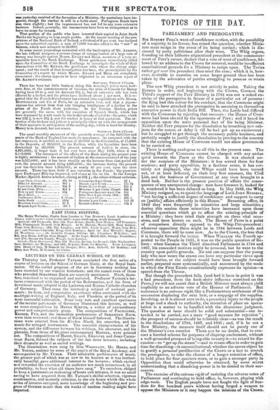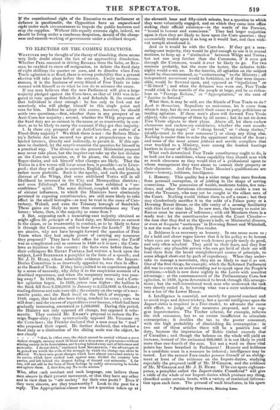TOPICS OF THE DAY.
PARLIAMENT AND PREROGATIVE.
SiR ROBERT PEEL'S want-of-confidence motion, with the possibility of a majority in its favour, has raised the question, whether Minis- ters must resign in the event of its being carried ; which is dis- cussed by party politicians after their wont. The Whig organs, founding on their hitherto stigmatized precedent at the commence- ment of PITT'S career, declare that a vote of want of confidence, fol- lowed by an address to the Crown for removal, would be insufficient constitutional grounds for a Ministry to resign upon. The Tories rather get over the precedent than meet the case; which it is, how- ever, desirable to examine on some larger ground than has been taken by the advocates of parties struggling to possess or retain place.
The new Whig precedent is not strictly in point. Taking the Estates in order, and beginning with the Crown, GEORGE the Third's support of the PITT Ministry in 1784 was not a naked ex- ercise of the prerogative in favour of a particular set of persons : the King had this colour for his conduct, that the Commons might be said to have attacked the prerogative in assuming to themselves executive power in their India Bill. Then, the Lords had differed with the Commons by rejecting that measure : the House of Com- mons had been elected by the opponents of PITT ; and it based its opposition upon the mere personal fact of his being Minister. Neither did PITT prepare for the dissolution by broaching new sub- jects for the nonce, or delay it till he bad got up an excitement ; but he struggled to get through the necessary public business, and probably sought to justify the dissolution by proving to the country that the existing House of Commons would not allow government to be carried on.
There is nothing analogous to all this in the present case. The existing House of Commons cannot be charged with any undue spirit towards the Peers or the Crown. It was elected un- der the auspices of the Ministers : it has served them for four sessions ; and party opposition, in a factious sense, it has cer- tainly not displayed, else the Whigs could have been turned out, or at least defeated, on their very first measure, the Civil List, and the business of Government at any time brought to a. dead lock. Neither is the present position of affairs the conse- quence of any unexpected change : men have foreseen it, looked for it, wondered it has been delayed so long. In May 1839, the Whig Ministry resigned, as, to quote the language of Lord JOHN RUSSELL, " not having a sufficient degree of confidence and support to carry on [public] affairs efficiently in this House." Resuming office, in 1840 they were frequently in minorities and large minorities ; during this session those minorities have increased upon those essential questions which go to affect the existing-principle of a Ministry : they have tried their strength on three vital occa- sions, and been beaten on each. The House of Peers is a point of comparison directly opposed to the Whig-Pitt-precedent: whatever opposition there might be in 1784 between Lords and Commons, there will be none now. As to the Crown, the less that it is brought forward the better. When WILLIAM the Fourth ap- pealed to the People in 1831, it was on the public question of Re- form : when GEORGE the Third dissolved Parliament in 1784 and 1807, his concealed motives might be personal, but he went to the country upon public grounds. No one can suppose that the young lady who now wears the crown can have any particular views upon Import-duties, or the subject would have been brought forward earlier, prepared more systematically, and announced by the mode in which the First Estate constitutionally expresses its opinion—a speech from the Throne.
But though the precedent fails, (and had it been in point it was a bad precedent, from the back-stairs influence exercised on the Peers,) we will not assert that a British Minister must always yield implicitly to an adverse vote of the Houses of Parliament. But resistance is an extreme right, like a Parliamentary settlement of the succession displacing the next heir, or a stoppage of the supplies. Involving, as it is almost sure to do, a pecuniary injury to the people at large and a shock to authority, the retention of place on specu- lation is a matter to be handled-with the discreetest judgment. The question at issue should be solid and substantial—one in- tended to be carried, not a mere "good measure for rejection "; the prospect of success should be tolerably clear—as was the result in the dissolutions of 1784, 1807, and 1831; and, if it be not a New Ministry, the measure itself should not be purely one of the Minister's own creation There can be no doubt, that to con- coct a hurried scheme for purposes of claptrap excitement, without a well-grounded prospect of being able to carry it—to retard its dis- cussion—to "get up the steam"—and to retain office in order to gain time for dissolving—is unconstitutional, whether the secret object be to gratify a personal predilection of the Crown or a lust to stretch the prerogative, to take the chance of a longer retention of office, to hold place for four quarters more, or to gain a stronger party in Opposition than could otherwise be obtained, by some secret understanding that a dissolving-power is to be denied to their suc- cessors.
The exercise of the extreme right of resisting the adverse votes of Parliament and continuing to hold office, is, however, playing with edge-tools. The English people have not fought the fight of free- dom for five hunired years without having forged a weapon to oppose the Ministers or it may happen the minions of the Crown. If the constitutional right of the Executive to set Parliament at defiance is questionable, the Opposition have an unquestioned right under such circumstances to impede the public business and stop the supplies. Without this equally extreme right, indeed, we should be living under a cumbrous despotism, devoid of the cheap- ness and smooth-working of government under a civilized despot.



























 Previous page
Previous page